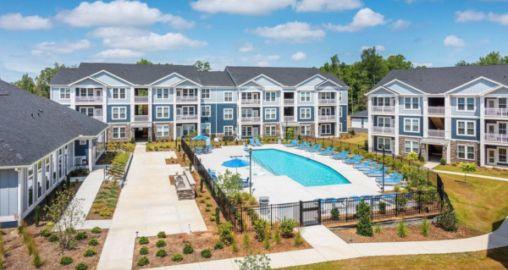Jury Convicts United Development Funding CEO Hollis Greenlaw and Colleagues on Securities Fraud, Conspiracy Charges
January 24, 2022 | James Sprow | Blue Vault
The CEO of North Texas-based residential real estate development lender United Development Funding and three of his colleagues were found guilty on Jan. 21 on securities fraud, wire fraud and conspiracy charges.
Jurors deliberated for about 12 hours over two days after a one-week trial in which U.S. District Judge Reed O’Connor put strict time limits on the federal prosecutors and defense attorneys to present their side of the case.
Hollis Greenlaw, co-founder, CEO and chairman of UDF’s board of trustees, stood trial alongside Cara Delin Obert, UDF chief financial officer; Jeffrey Brandon Jester, UDF director of asset management; and Benjamin Lee Wissink, UDF partnership president and committee member.
All four executives were convicted on all 10 counts they faced. Lawyers for the defendants said they plan to appeal the jury’s decision.
“There was insufficient evidence to convict,” defense lawyer Paul Pelletier, who represents Greenlaw and Grapevine-based United Development, told the Dallas Business Journal in the hallway after the verdict was read. “Anybody watching that trial could see that, and we will be forthwith appealing.”
U.S. Attorney Chad Meacham said, “After a long battle, justice has been done.”
“UDF executives shuffled money from one fund to another without disclosing the commingling to investors or regulators,” Meacham said in a statement. “The Justice Department takes financial improprieties seriously, and we are proud to hold these defendants accountable for their crimes.”
Word spread around the courthouse slightly before 5:30 p.m. Jan. 21 that the jury had reached a verdict. Earlier in the afternoon, about 3 p.m., the jury had sent O’Connor a note saying they were stuck at 10-2 and didn’t think they could reach a unanimous decision, as required by law. O’Connor instructed them to continue deliberating.
A hush fell over the courtroom and all eyes turned to door 205-A, “Jury Room,” as the seven women and five men filed in. Each of the jurors looked toward their chair or the ground, avoiding a glance at the prosecution or defense tables as they walked to their seats.
The defendants stood near motionless as the guilty verdicts were read count by count. Obert shook her head “no,” ever so slightly, when the judge got to the fifth or sixth count. The courtroom was quiet, save for the soft sobs from one family member near the back of the gallery.
After the verdicts came down, Greenlaw removed his dark suit coat and green tie before being handcuffed by a U.S. Marshal and led from the courtroom. Obert, Jester and Wissink followed suit.
The four were taken into custody despite requests from their respective attorneys that they remain free, pending a detention hearing scheduled for Jan. 24.
Each will undergo a pre-sentence investigation to be conducted by March 14. A May 20 sentencing hearing will be held before O’Connor. The defendants face up to 25 years each in federal prison.
The four UDF executives were convicted of an alleged scheme to defraud the investing public, shareholders and banks using funds that provided more than $1 billion in loans to developers of residential housing communities and, to a lesser extent, homebuilders.
Prosecutors in the Northern District of Texas charged the UDF executives with conspiring to illegally shift investment dollars in three of its different funds to deceive banks and investors and enrich themselves.
In closing arguments Jan. 20, Assistant U.S. Attorney Tiffany Eggers, the lead prosecutor, told the jury that the UDF executives “engaged in a large-scale scam and they did it month after month.”
“The defendants had to choose failure or fraud, and they chose fraud,” Eggers said.
Pelletier said UDF’s business is so complex that the government investigators and prosecutors don’t understand it, and they never truly tried.
“The government got it wrong,” he said.
Throughout the trial, Eggers hammered away at that argument. At the same time, defense lawyers attempted to convince jurors that the evidence and testimony presented fell short and left room for reasonable doubt at the very least.
Eggers argued that transfers made between the REIT’s funds are illegal and were a reaction to shortfalls that arose when developers were slow to repay the money they borrowed from UDF.
The defense said their clients individually and UDF as a company broke no laws. Prosecutors and government regulators who investigated the case don’t understand the residential development process and how housing communities are financed and constructed in phases, lawyers for the executives said.
In his closing argument, Neal Stephens of law firm Jones Day, who represents Obert, said no investors lost money.
“What’s completely lacking in this case is any evidence that any of these people did anything to harm any investor,” he said.
At the outset, the FBI thought they were investigating a billion-dollar Ponzi scheme. When their findings didn’t match those expectations, the government refused to be open to the far less-interesting truth, the UDF executives’ lawyers argued.
UDF has a family of five public and private funds: UDF I, II, III, IV and V. Each aims to give investors differently tailored opportunities to diversify their portfolios with investments in residential real estate.
The firm created UDF III to originate, acquire and manage a portfolio of mortgage loans or equity interests in various real estate investments.
A separate entity called UDF IV was later created as a loan facility for developers of single-family homes and mixed-use community developments.
When UDF III borrowers became slow to pay their obligations, UDF executives began using fund IV capital for fund III obligations, according to prosecutors. Between January 2011 and November 2015, more than $65 million in cash raised by UDF IV was used to pay investors in UDF III a return on their money, as well as other corporate expenses, according to the indictment.
In her closing, Eggers implored the jury to pore over the thick binders and digital copies of bank account statements, emails between UDF employees and developers outside the company, and other evidence. She also asked the jury to ignore the argument that UDF has a good working environment, which multiple witnesses — most testifying at the prosecution’s behest — emphasized during the trial.
“Nowhere in the jury instructions does it say, ‘If everyone enjoys their job, it’s not a crime,’” Eggers said.
Pelletier ended his argument forcefully: “There is insufficient evidence to prove any of this,” he said. “Let these people go back to their jobs.”
SUMMARY OF CHARGES
The indictment alleged that the defendants were part of a scheme to defraud and conspiracy, ending in 2015, in connection with the business operations of United Development Funding. The four defendants were found guilty on all counts:
Count 1: Conspiracy to commit wire fraud affecting a financial institution
Count 2: Conspiracy to commit securities fraud
Counts 3 through 10: Substantive counts of securities fraud
Source: Houston Business Journal, January 24, 2022










